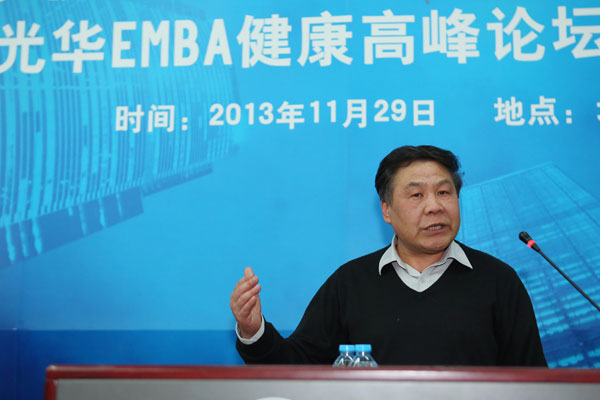

While increasingly more people are trying to get into China's health industry, those who already work in the sector shared the difficulties they encountered and their views on risks at a forum held Friday by Guanghua Management School of Peking University.
|
 |
|
Zhang Kaidi, vice president of the China Silver Industry Association. [Provided to chinadaily.com.cn] |
In a guideline issued on Oct 14, China's State Council, the cabinet, set a target of increasing the gross value of its health service sector to over 8 trillion yuan ($1.31 trillion) by 2020.
Many might easily get excited by this huge 8-trillion-yuan pie, but how a piece of it could fall into one's pocket is the question, said Zhang Kaidi, who has been in the elderly care sector for 30 years and is also vice president of the China Silver Industry Association.
He advised that those who want to enter the industry must figure out the status quo before taking any action.
"People may have heard that one needs to wait 160 years to attain a bed at a nursing home in Beijing, but as far as I know, there are 80,000 beds in Beijing, but only five percent of them are actually in use," he said.
In addition to learning about the industry, a company needs to know what it can and cannot do, according to Mo Fei, chairman of the Beijing Enterprises Group Senior Industry Investment & Management Co Ltd.
Mo said her company was a pioneer in entering the market, but it met some unexpected problems. She said the company refurbished an idle three-star hotel in downtown Beijing into an elderly care center quickly but found it could not set up its operation team on time.
"We know real estate, which is our core business, but we do not know elderly care, which is new to us," she said.
While Mo and her company is learning lessons and growing, she said a lot of venture capitalists have contacted the company.
The problem is the company needs to show them its business model when it is still figuring one out, she said.
Sylvia Pan, vice president of United Family Healthcare, the first and largest foreign-funded healthcare institution in China, warned venture capitalists about the risks of investing in hospitals.
Pan, who has been with the medical group for 17 years, said investment in medical institutions involves a lot of fixed asset investments, which may take 20 years to see any returns.
She said in addition to the big investments with slow returns, venture capitalists need to know that medical workers may have quite different ideas about operation, which can pose great challenges.
 Getting in the mood
Getting in the mood
 Models at Mercedes pavilion at 2013 Auto Guangzhou
Models at Mercedes pavilion at 2013 Auto Guangzhou
 Buick Riviera concept car at 2013 Auto Guangzhou
Buick Riviera concept car at 2013 Auto Guangzhou
 FAW-VW all-new Golf at Guangzhou auto show
FAW-VW all-new Golf at Guangzhou auto show
 VW donates more than 5k child safety seats
VW donates more than 5k child safety seats
 Honda models at 2013 Guangzhou auto show
Honda models at 2013 Guangzhou auto show
 Honda Jade at the 2013 Guangzhou auto show
Honda Jade at the 2013 Guangzhou auto show
 Toyota's new Reiz debuts at 2013 Auto Guangzhou
Toyota's new Reiz debuts at 2013 Auto Guangzhou